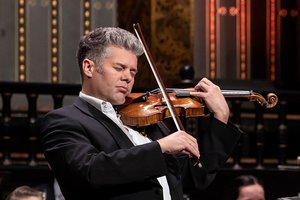BRAHMS: Violin Concerto in D major, op. 77
- intermission -
BEETHOVEN: Symphony No. 9 in D minor, op. 125
Barnabás Kelemen violin, Klára Kolonits soprano, Lúcia Megyesi Schwartz alto, Bernhard Berchtold tenor, Miklós Sebestyén bass baritone
Kodály Choir Debrecen (chief choir director: Zoltán Kocsis-Holper), Concerto Budapest
Conductor: András Keller

“The entire work is in symphonistic style and the attention is immediately drawn to motifs cross-sounding in three parts. However, as a violin concerto this work will not be able to evoke a long-term effect because of its complicated composition and only Joachim is capable of coping with the technical challenges we particularly come across in the finale.” These words are taken from a report by a Pest newspaper in January 1878 about the concert at the Vigadó in which József Joachim played the Brahms Violin Concerto barely more than a week after its world premiere in Leipzig. As for its long-term impact, well this has been proven over the past 140 years or so, and we can have no doubt, either, that Kossuth Prize laureate Barnabás Kelemen is fully up to the job of handling the virtuoso solo part. If one can say, reasonably, that the Brahms piece is a core element of the concert repertoire held in great esteem, then the term ‘iconic’ at the very least could be applied with regard to the masterpiece played after the intermission. After all, it is Beethoven’s Ninth we are talking about. Debussy wrote the following: “The Ninth Symphony has been shrouded in a fog of noble words and decorative statements. It’s the masterpiece about which more nonsense has been spread than any other. One can be amazed that it hasn’t long since been buried under the mountain of writings issued forth by it.” The cult status of Symphony No. 9 has still not managed to bury the work, ample proof of which is given by the interpretation of András Keller et al.
